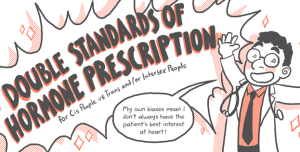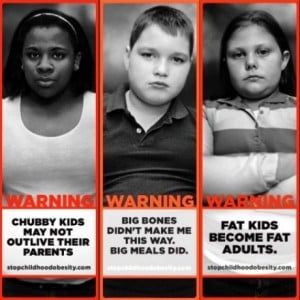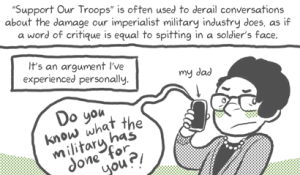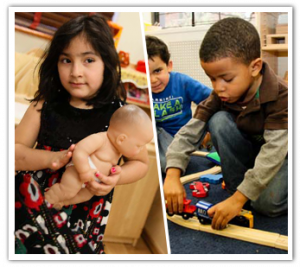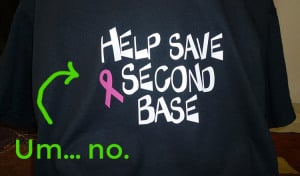Originally published on Babydust Diaries and cross-posted here with permission.

Jennifer Livingston, a local news anchor, responds to fat-shaming hate mail. Credit: Slate
People get very uncomfortable when I refer to myself as “fat.” I’ve been doing this for years. I was much thinner when I started and I said it in a way of dissing myself before someone else could. It wasn’t a very healthy thing. Now that I’m older, I say it for a much bigger reason which is what I want to address here.
Whenever I describe myself as fat my friends will normally say “I don’t think of you as fat.” I used to feel pleased when they said this (and I was probably fishing for just that) but now I’m just confused. I mean, I am in fact fat. No one ever says “I don’t think of you with blue eyes” or “I don’t think of you as short.” Really? Do you think of me as brown eyed? That sounds ludicrous, right?
Well, what are you saying when you tell a friend “I don’t think of you as fat”? Do you think of me as thin? Perhaps you need an optometrist? Fat, i.e. having more adipose (fat) tissue than most people, is a completely objective measure just as my eye color and height. I might be bluer-eyed, taller, or thinner compared to another person but it doesn’t change the basic description. So why would someone go out of their way to assure me I’m not “fat”.
What does fat mean?
In our society fat, unlike blue and short, have a mile of connotation behind their surface meaning. Being FAT means being lazy, slovenly, disgusting, ugly, stupid, and unlovable. Think I’m being dramatic? Tons of studies have looked at size-discrimination and how prevalent it is in our society. One study noted that “[fat job candidates] were less desirable employees who, compared with others, are less competent, less productive, not industrious, disorganized, indecisive, inactive, and less successful.. “1 In another study ““Children as young as 6 describe silhouettes of the obese child as ‘lazy’, ‘dirty’, ‘stupid’, ‘ugly’, ‘cheats’, and ‘lies’”2
So, when my friend says “I don’t think of you as fat” she’s really saying I don’t think of you as a lazy, ugly, disgusting slob. Thank you. I am none of those things. However, when you say this you contribute to the power given to the word fat and, even if you don’t choose the meaning, you reinforce the stereotypes you are so adamant I don’t display.
Allowing fat to equal bad and thin to equal good harms both groups (and particularly women). Case in point; thin people not being tested for illnesses because it is assumed they are healthy because of their size. In fact a fat person who eats healthy and exercises is way healthier than a thin person who eats cookie dough by the tub while watching RHOBH marathons. Meanwhile, a fat girl gets a therapist that can’t stop assuming her clinical depression is all about her weight!3
But, perhaps the biggest problem is that the resulting preoccupation with SIZE over health leads to the alarming rates of Eating Disorders and disordered eating habits in children and young adults. Just look at some of these stats;
- Over one-half of teenage girls and nearly one-third of teenage boys use unhealthy weight control behaviors such as skipping meals, fasting, smoking cigarettes, vomiting, and taking laxatives4
- 42% of 1st-3rd grade girls want to be thinner5
- 81% of 10 year olds are afraid of being fat6
We are raising people who hate themselves and/or spend inordinate amounts of time thinking about food, diets, and appearance. It astounds me to think of the change the world could see if that energy was free for something important. As Eve Ensler says, “It seems to me that we spend an inordinate amount of time and attention on fixing ourselves when we could really be directing that out to serving others.”
I hope my daughter is in her 20’s before she knows the word “diet” can be a verb. Let her answer “what is your diet?” with “omnivore7.” Save her from knowing that she is an anomaly if she isn’t constantly in a state of flux with her body trying to become the next thing instead of feeling whole in her skin.
Parenting for size acceptance
We, as parents, have a powerful platform on which to make change. We can raise the next generation to love their bodies and to not judge others by their outward appearance. Here are 15 tips to raise size-accepting children:
- Never use the word fat in a derogatory way. Avoid media that does.
- Never imply that I can’t do something or wear something because of my size (“oh, not with these thighs!”)
- Never compliment others based on size (how many times is “you look so thin!” the ultimate compliment?)
- Point out the beauty of diversity in people and nature – nurture the idea that beauty is diversity.
- Avoid making physical activity about size or based on what you ate (“I have to jog off that cake”). Physical activity should be joyful.
- Do not label foods as “good” and “bad”
- Offer a variety of foods and model moderate indulgence and a wide consumption of foods. Eating should be joyful.
- Don’t make your kids eat if they say they aren’t hungry
- Don’t deny your kids food if they say they are hungry.
- Never comment on the amount (too little or too much) that your kids eat.
- NEVER use food as a reward, incentive, or punishment! (this is SO abused among parents!!)
- Guard your children against negative body-image media – stop your subscriptions to women’s mags, don’t watch Biggest Loser, Toddler and Tiaras (focusing on appearance), and any variety of shows promoting appearance as a route to happiness.
- Avoid talking about a nutrionalist approach to food – disassembling “food” into fat, carbs, calories, and other things that need to be obsessed about and counted (difficult since it is explicitly taught in many schools).
- Encourage alternative means of self-esteem besides appearance – spirituality, values, empathy, effort, etc.
- Volunteer! It is much harder to think of something so superficial as size in the face of true plight.
We can change these things. Right now. Today. We can stop saying negative things about our bodies or associating negative qualities with ourselves and others based on size.
We can change the definition of fat to mean… well, just fat. Like blue and short. So that it won’t be necessary to remind someone that they are worthy.
Then you can go ahead and think of me as fat without being uncomfortable about it.
Paige Stannard is a Staff Writer for Everyday Feminism. She’s a former NASA research librarian happy to be home raising her 3 IVF babies after nearly a decade of infertility. She blogs about infertility, parenting, and women’s issues at Baby Dust Diaries as well as being the founder of the gentle discipline site ParentingGently.com and co-founder of the breastfeeding rights site NursingFreedom.org. She likes to cook and sew and has, in general, become her mother. Happily. Follow her on Twitter @babydust.
Search our 3000+ articles!
Read our articles about:
Our online racial justice training
Used by hundreds of universities, non-profits, and businesses.
Click to learn more
Most Read Articles
- « Previous
- 1
- …
- 30
- 31
- 32






